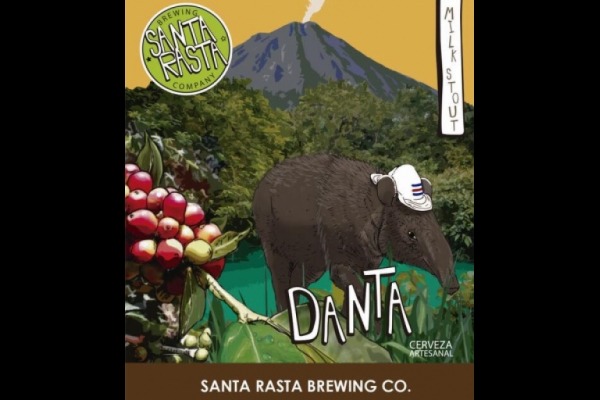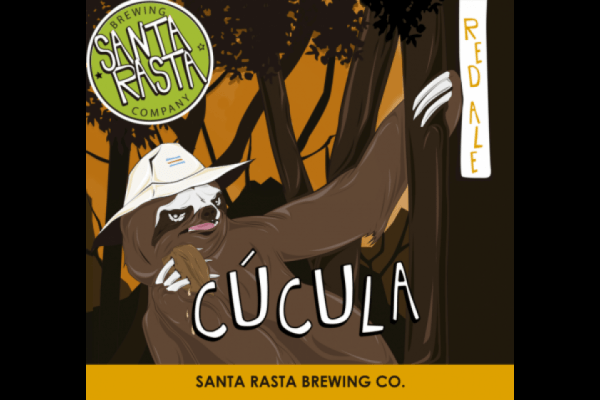Cheers! To the nature conservancy!

Photo: Santa Rasta Brewing Co.

Adrián Valdelomar -who spent his childhood in a farm- is the founder of the Santa Rasta Brewing Company in San José, Costa Rica. Photo: Lucy Calderón

Orange and ginger give rise to the Baula beer that sponsors the conservation of the turtle with the same name. Photo: Santa Rasta Brewing Co.

The cas fruit gives rise to the Congo beer that supports the Congo Monkey (Alouatta palliata). Photo: Santa Rasta Brewing Co.

Coffee grains give flavour to Danta (Tapirus bairdii). Photo: Santa Rasta Brewing Co.

Lemon and mandarin is the mixed flavour of the beer called Lapa that supports the conservation of the green Lapa (Ara ambiguus). Photo: Santa Rasta Brewing Co.

The Cúcula beer is made from cocoa and supports the conservation of the slot named Cúcula (Bradypus variegatus). Photo: Santa Rasta Brewing Co.

Adrián Valdelomar -second from left to right- joined by the people from EPI. Photo: Santa Rasta Brewing Co.
Convinced that you can have a project that apart from being profitable offers a contribution to the conservation of animal species in danger of extinction, Adrián Valdelomar Espinoza founded the Santa Rasta artisan nanobrewery in Costa Rica.
Santa Rasta has made alliances with nongovernmental organizations that work in favor of nature, and in order to support their mission it allocates them a percentage of the sales of its beer production. In addition, all the beer containers have the image of the species that they sponsor.
Although Santa Rasta is only sold in Costa Rica –paying taxes and fulfilling the legal and sanitary requirements to operate- Valdelomar believes that the project could be replicated in the other Central American countries, like franchises, and in doing so, you could be helping both the preservation of nature and the development of small producers.
What flavor do you prefer?
Orange and ginger give rise to the Baula beer that sponsors the turtle of the same name (Dermochelys coriacea). From the cas fruit rises the Congo beer that supports the Congo Monkey (Alouatta palliata).
Coffee grains give flavour to Danta (Tapirus bairdii); lemon and mandarin, to the green Lapa (Ara ambiguus); and cocoa to the sloth named Cúcula (Bradypus variegatus).
To create those singular flavours, Santa Rasta uses local fruits and produces batches from 7 to 10 gallons. That is why the factory is called a nanobrewery. The company also supports local farmers from which it acquires the fruits.
The presentation of each type of beer is in bottles of 350 milliliters and in metallic kegs of 5 gallons. As for its alcoholic content, it varies. They range from very mild with 4.2% alcohol to 7.3%.
The first big recognition to Santa Rasta
For his undertaking in the manufacture of artisan beers with the vision of supporting the conservation of endangered species Adrián Valdelomar was selected in 2017 to participate in the Young Leaders of the Americas Initiative (YLAI), a five-week program for entrepreneurs, funded by the U.S. Department of State´s Bureau of Educational and Cultural Affairs.
YLAI brings 250 promising leaders from Latin America and the Caribbean each year to the United States to expand their leadership and entrepreneurial skills and network through skills-building workshops and opportunities to learn from and exchange with U.S. counterparts. This program is open to young entrepreneurs 25-35 years of age, selected for participation via a competitive applications process which is already open for those who want to participate in 2018.
Thanks to the support of his fellowship, Valdelomar had an orientation week in Atlanta, Georgia. Then he was sent to Seattle in Washington State where the Council of International Affairs of that city is the executing partner of YLAI.
Valdelomar who is engineer and master in industrial engineering had the opportunity to exchange knowledge in the manufacturing of artisan beers with Wayne Jehlik founder of the Obec brewery based in the Ballard area in Seattle.

Stacey Jehlik, Adrián Valdelomar and Wayne Jehlik at the artisan brewery Obec, in Seattle.
A good partner
Valdelomar points out that in order to succeed in a venture you have to join into partnership with loyal people who feel the same passion and desire to improve. That is why he is very happy and thankful to his partner and co-founder Luis Campbell, an industrial engineer and mechanic, with two masters degrees, who has supported him in this adventure of manufacturing artisan beers.
Luis is in charge of the operations area of the company and of generating new alliances to fulfill his objective of producing a beer of excellent quality that supports the conservation of nature. For example, they already have an alliance with a gelateria that will make the first ice cream based on the coffee flavored beer, Danta.
In December 2017, they did an activity with Ecology Project International Costa Rica (EPI), an organization that manages the Pacuare Reserve, where the Baula turtle is protected and they donated a percentage of the sales of that event.

This is the flyer of an activity organised between Santa Rasta and EPI in Costa Rica.
The current challenges
After his fellowship in Seattle, Valdelomar is currently at the University of California at Davis, California where in January he began a six-month course to support all his experience in making artisan beers and become a brew master.
According to him, in this training he will learn more about the quality of the water for the manufacture of beers, yeasts, malts, types of hops, processes, packing, among other major topics that will prepare him to later get the Distillery Institute and Brewery´s certification, in London, England which is better known as IBD, for its acronym in English.
Last but not least, Valdelomar wants to carry out an investment analysis to increase his Company´s production capacity and the number of places where he offers the product.
The challenge of finding an investor who supports him is great, but he is convinced that the results he has obtained to date will help him attract people with vision and with a desire to preserve nature.

Add new comment